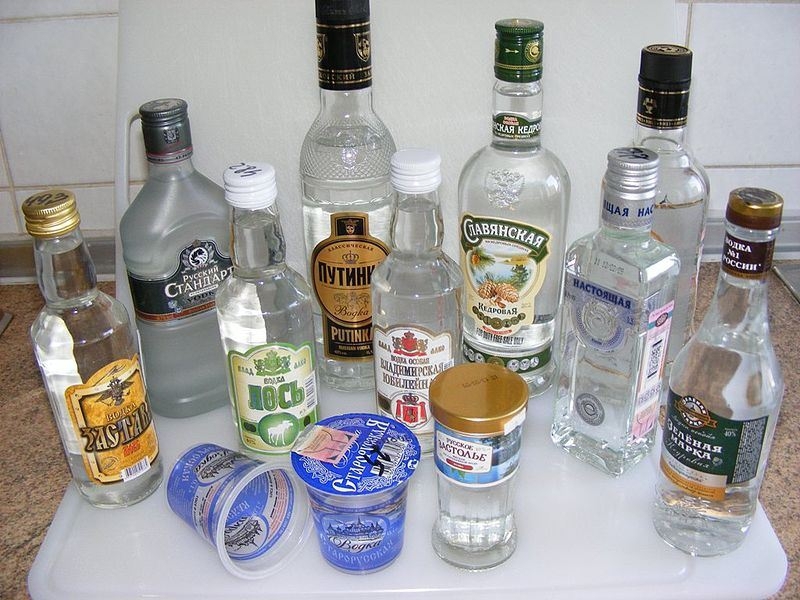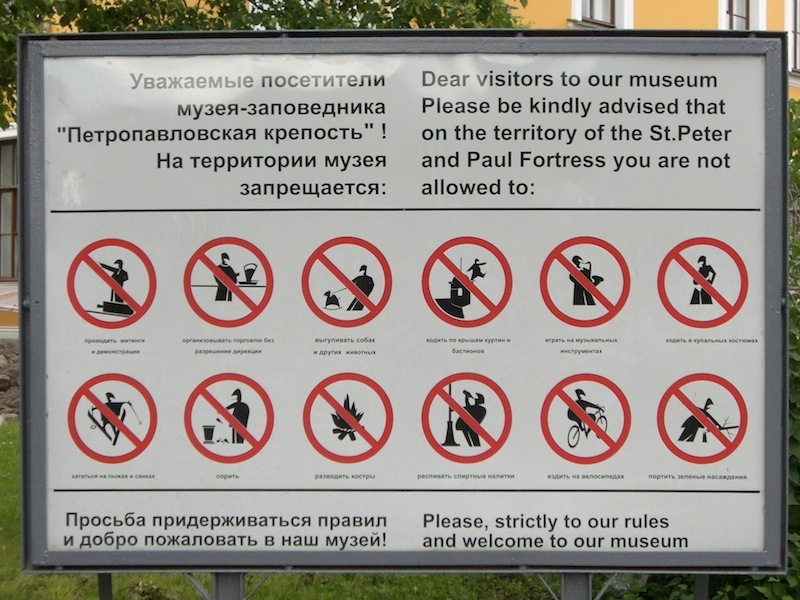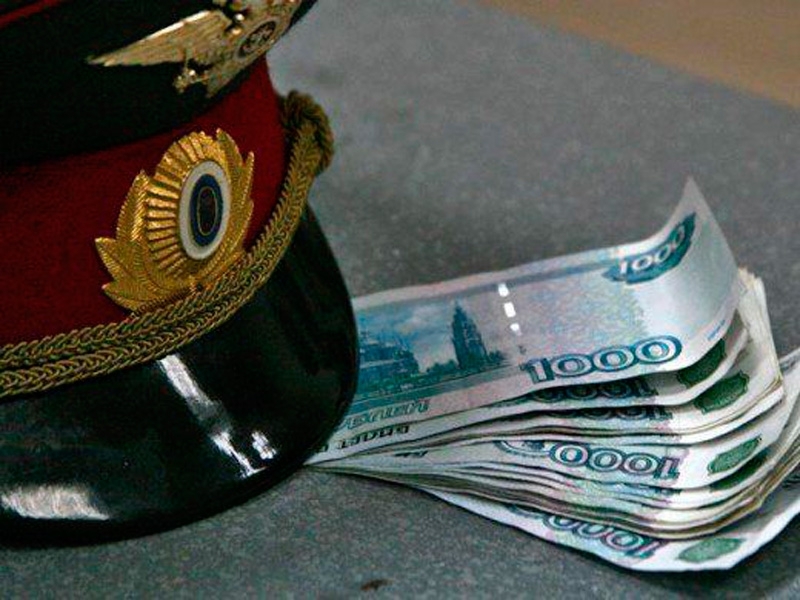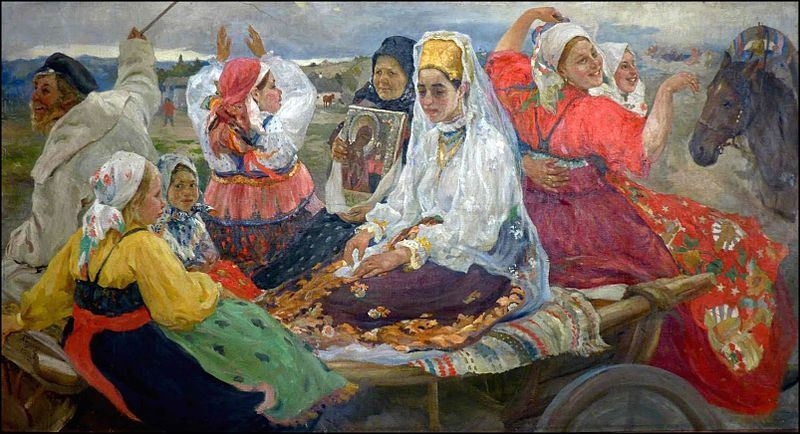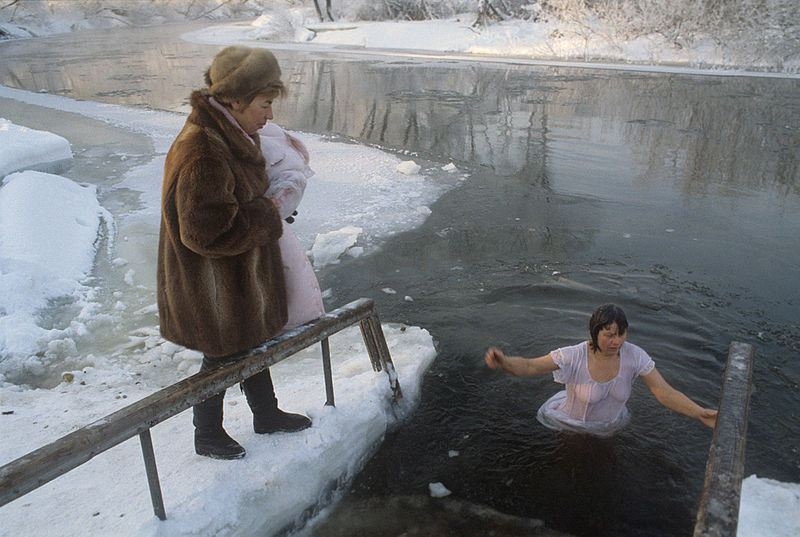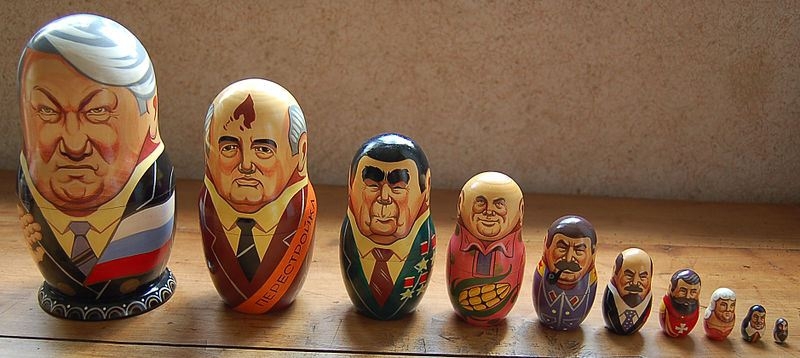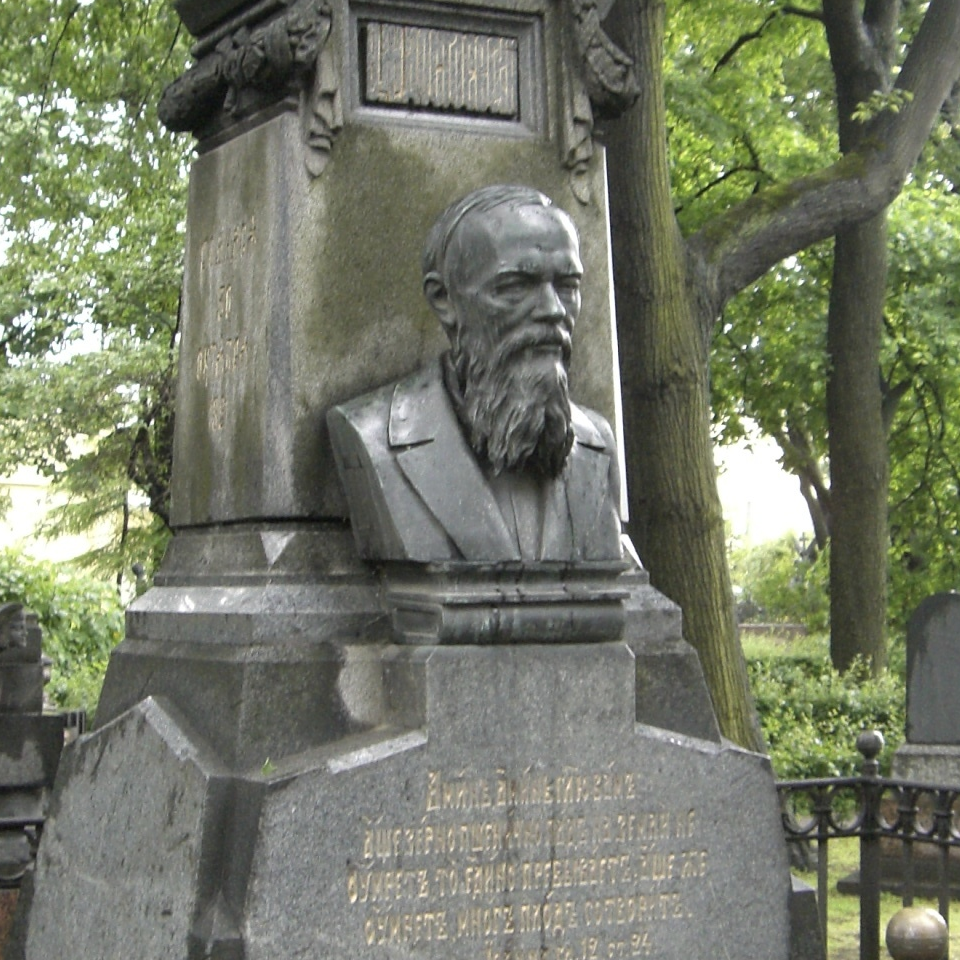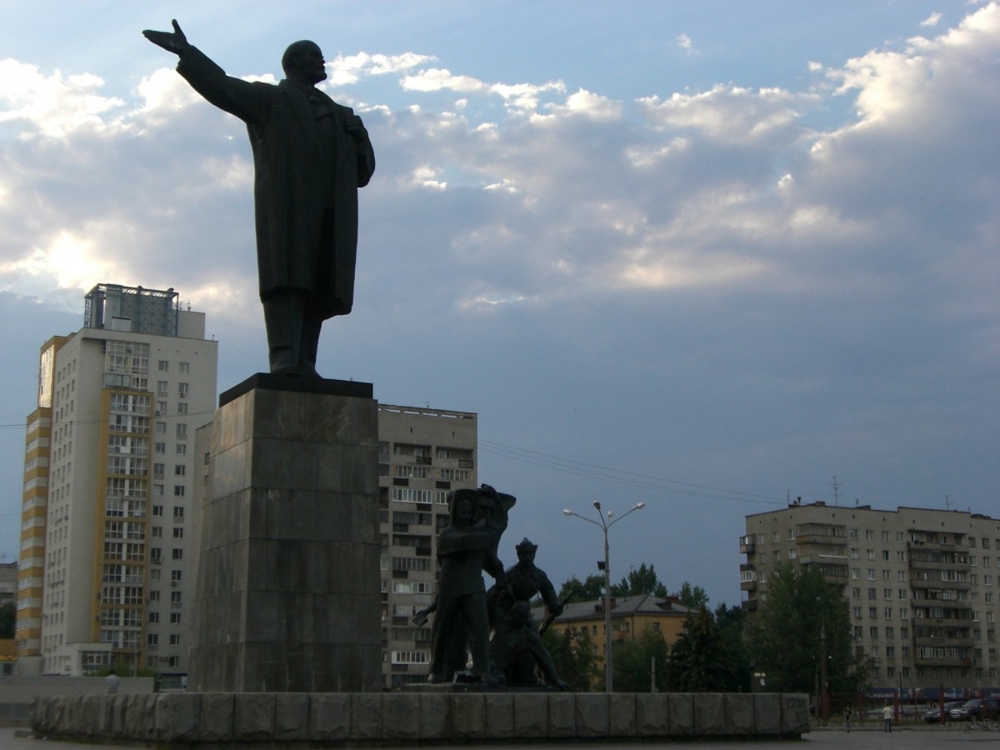0
10
Some Russian stereotypes are incredibly true. There’s a lot more to the country than just a few preconceived notions, but if you’re wondering if Russians love vodka or if entire cities get snowed under, well…let’s find out!
1) They love their vodka
So all Russians are vodka-swilling alcoholics just a few brief steps away from alcohol poisoning, right?
Well, not quite. Though vodka is still king, beer sales exploded in the early 2000s due to cheap costs and lax regulation. Beer wasn’t even classified as an alcoholic drink until quite recently, seen as more of a light refresher. Like a soda! Though I guess it really only furthers the stereotype of drunk Russians when Russia didn’t even think beer was strong enough to be considered alcohol.
But the point is, things are changing. Russia does indeed enjoy its most traditional spirit, but beer and wine are widely enjoyed as well, and the allure of high-end Western brands is frequently on display at fancier clubs and bars.
That said, they drink a lot. And I mean a lot. Whenever I sat down for dinner with a Russian family, they took the vodka out of the freezer and we downed that bottle like it was our last night on Earth. You know what it’s like downing 9 shots of vodka over the course of a half hour meal? Well I sure do.
But even so, the mom and daughter were drinking champagne. In sane amounts.
Plus, Russians aren’t even the biggest drinkers on the planet. But they sure are close. Alcoholism has been declared a national problem, and when you consider it’s mostly the men who drink in large quantities (and whose life expectancy is significantly lower as a result), you realize they’re making up for the lower drinking rates of the ladies, and the image of a drunk uncle causing a ruckus at a wedding is all the more believable.
So all Russians are vodka-swilling alcoholics just a few brief steps away from alcohol poisoning, right?
Well, not quite. Though vodka is still king, beer sales exploded in the early 2000s due to cheap costs and lax regulation. Beer wasn’t even classified as an alcoholic drink until quite recently, seen as more of a light refresher. Like a soda! Though I guess it really only furthers the stereotype of drunk Russians when Russia didn’t even think beer was strong enough to be considered alcohol.
But the point is, things are changing. Russia does indeed enjoy its most traditional spirit, but beer and wine are widely enjoyed as well, and the allure of high-end Western brands is frequently on display at fancier clubs and bars.
That said, they drink a lot. And I mean a lot. Whenever I sat down for dinner with a Russian family, they took the vodka out of the freezer and we downed that bottle like it was our last night on Earth. You know what it’s like downing 9 shots of vodka over the course of a half hour meal? Well I sure do.
But even so, the mom and daughter were drinking champagne. In sane amounts.
Plus, Russians aren’t even the biggest drinkers on the planet. But they sure are close. Alcoholism has been declared a national problem, and when you consider it’s mostly the men who drink in large quantities (and whose life expectancy is significantly lower as a result), you realize they’re making up for the lower drinking rates of the ladies, and the image of a drunk uncle causing a ruckus at a wedding is all the more believable.
2) They’re all stony-faced and mean
I’ll be happy to point out that this one is simply a big misunderstanding. The unfortunate fact of the matter is that most visitors only ever meet people in a bureaucratic setting; ticket booth operators, hotel staff, police officers doing a “random” passport check, and other fun stuff that only helps feed the notion that Russians don’t seem polite or friendly.
But when you sit down for dinner with them, they’ll feed you until your stomach explodes and pour you shot after shot of vodka until your liver explodes too. What’s the deal?
Oddly enough, it’s purely bureaucratic. They’ll have no interest in serving your needs when behind a glass barrier of some kind, but take the glass away, and they’ll open their kitchens and liquor cabinets and offer you as much as you can possibly handle. Plus 25% more.
Also, to fulfill your “I learned something new today” quota, Russians don’t smile to be friendly. They smile when something is funny. Once you realize that, the stony-faced demeanor is actually just fine, since they can be perfectly straightforward about taking care of things, but without being all smiley about it.
And speaking of glass barriers…
I’ll be happy to point out that this one is simply a big misunderstanding. The unfortunate fact of the matter is that most visitors only ever meet people in a bureaucratic setting; ticket booth operators, hotel staff, police officers doing a “random” passport check, and other fun stuff that only helps feed the notion that Russians don’t seem polite or friendly.
But when you sit down for dinner with them, they’ll feed you until your stomach explodes and pour you shot after shot of vodka until your liver explodes too. What’s the deal?
Oddly enough, it’s purely bureaucratic. They’ll have no interest in serving your needs when behind a glass barrier of some kind, but take the glass away, and they’ll open their kitchens and liquor cabinets and offer you as much as you can possibly handle. Plus 25% more.
Also, to fulfill your “I learned something new today” quota, Russians don’t smile to be friendly. They smile when something is funny. Once you realize that, the stony-faced demeanor is actually just fine, since they can be perfectly straightforward about taking care of things, but without being all smiley about it.
And speaking of glass barriers…
3) It’s a bureaucratic nightmare
I’ll be the first to say that this is 100% true. Any attempt to deal with bureaucracy and red tape is going to be a soul-destroying endeavor that tests your faith in humanity to its most extreme. The chances of you coming out of this experience with your optimism intact is about the same as the likelihood of you sitting down with a Russian family for dinner and coming away sober.
Everything from visas to train tickets to permits of any kind are going to take 43% longer than you expect, succeed 28% less often, and cost 34% more. Be prepared. Then prepare some more. Have a bottle of vodka available back in your room so you can drown your sorrows and frustrations as soon as things go horribly wrong.
(The one exception: Train travel. The Russian train system makes the more “modern” European rail system seem like a rickety ride along a dirt road in a horse and buggy.)
A friend of mine referred to all the these nuisances and fees as the “speed tax,” which, when implemented, I have been informed works very efficiently. But if you’re not planning on a bribery attempt, expect things to take their sweet time.
And speaking of bribery…
I’ll be the first to say that this is 100% true. Any attempt to deal with bureaucracy and red tape is going to be a soul-destroying endeavor that tests your faith in humanity to its most extreme. The chances of you coming out of this experience with your optimism intact is about the same as the likelihood of you sitting down with a Russian family for dinner and coming away sober.
Everything from visas to train tickets to permits of any kind are going to take 43% longer than you expect, succeed 28% less often, and cost 34% more. Be prepared. Then prepare some more. Have a bottle of vodka available back in your room so you can drown your sorrows and frustrations as soon as things go horribly wrong.
(The one exception: Train travel. The Russian train system makes the more “modern” European rail system seem like a rickety ride along a dirt road in a horse and buggy.)
A friend of mine referred to all the these nuisances and fees as the “speed tax,” which, when implemented, I have been informed works very efficiently. But if you’re not planning on a bribery attempt, expect things to take their sweet time.
And speaking of bribery…
4) All the cops are corrupt
This is partially true.
Russia has a horrific reputation for police corruption, government kickbacks, and all sorts of other ridiculous complications that stifle development and reward ruthlessness. And it’s kinda true. My very first day in Russia included the dreaded “passport check,” AKA a bribe request. It was the first of several, in Russia and other former Soviet states. And it was very annoying. Luckily for me, I am such a suave and sophisticated gentleman that most attempts at bribe extraction resulted in my brilliant and dashing escape. Only Moldova defeated me.
Keep your passport safe, kids. Hand them photocopies only. But on the other hand, sometimes the passport check works out hysterically. Good luck!
This is partially true.
Russia has a horrific reputation for police corruption, government kickbacks, and all sorts of other ridiculous complications that stifle development and reward ruthlessness. And it’s kinda true. My very first day in Russia included the dreaded “passport check,” AKA a bribe request. It was the first of several, in Russia and other former Soviet states. And it was very annoying. Luckily for me, I am such a suave and sophisticated gentleman that most attempts at bribe extraction resulted in my brilliant and dashing escape. Only Moldova defeated me.
Keep your passport safe, kids. Hand them photocopies only. But on the other hand, sometimes the passport check works out hysterically. Good luck!
5) Mail order brides actually exist
The only inaccuracy here is that they’ve evolved to email-order brides. And they’re mostly in Ukraine anyway.
I was somewhat skeptical this even existed, or that it could be anything more than isolated cases, but once I got to Odessa, there were billboards advertising gorgeous Ukrainian girls that just wanted to marry YOU. The Irish pub always had some English-speaking guy talking through a translator to a girl way out of his league. It was pretty creepy.
But that brings up another point; the stereotype that Russian and Ukrainian girls are incredibly attractive. I used to think this was just a silly notion, as there are all sorts of people all over the world, and a large part of it is due to their relatively low obesity rates combined with their extraordinarily high “always get dressed up” rates, but I have to say there’s something to it.
It could very well just be a genetic coincidence, but I heard another explanation while I was over there; Russia lost 20 million people during World War II, with heavy losses all over Eastern Europe as well. Though many of them were women, more of them were men, who died in combat. And after the war was over, who did they pick to marry? The pretty ones, of course.
I can’t say whether or not that’s the real reason, but I can’t see it not being at least somewhat true.
The only inaccuracy here is that they’ve evolved to email-order brides. And they’re mostly in Ukraine anyway.
I was somewhat skeptical this even existed, or that it could be anything more than isolated cases, but once I got to Odessa, there were billboards advertising gorgeous Ukrainian girls that just wanted to marry YOU. The Irish pub always had some English-speaking guy talking through a translator to a girl way out of his league. It was pretty creepy.
But that brings up another point; the stereotype that Russian and Ukrainian girls are incredibly attractive. I used to think this was just a silly notion, as there are all sorts of people all over the world, and a large part of it is due to their relatively low obesity rates combined with their extraordinarily high “always get dressed up” rates, but I have to say there’s something to it.
It could very well just be a genetic coincidence, but I heard another explanation while I was over there; Russia lost 20 million people during World War II, with heavy losses all over Eastern Europe as well. Though many of them were women, more of them were men, who died in combat. And after the war was over, who did they pick to marry? The pretty ones, of course.
I can’t say whether or not that’s the real reason, but I can’t see it not being at least somewhat true.
6) It’s really damn cold
Well, sort of. The Earth has an axis tilt, dummies! And without going through too much of a meteorological tangent, the short summary is that oceans keep temperatures moderate, while continents push temperatures high and low.
And look at Russia all the way up there. Once the summer sunshine starts beating down on it, there isn’t much ocean to sneak the heat away, especially in southern Siberia. It doesn’t happen every day, but summer highs can reach perfectly enjoyable sunbathing levels.
That said, it does get incredibly cold. Colder than anywhere besides Antarctica. The record for coldest temperature in a permanently inhabited place is shared by two Russian cities; Oymyakon and Verkhoyansk, both of which went down to -67.7° C (-90° F).
Well, sort of. The Earth has an axis tilt, dummies! And without going through too much of a meteorological tangent, the short summary is that oceans keep temperatures moderate, while continents push temperatures high and low.
And look at Russia all the way up there. Once the summer sunshine starts beating down on it, there isn’t much ocean to sneak the heat away, especially in southern Siberia. It doesn’t happen every day, but summer highs can reach perfectly enjoyable sunbathing levels.
That said, it does get incredibly cold. Colder than anywhere besides Antarctica. The record for coldest temperature in a permanently inhabited place is shared by two Russian cities; Oymyakon and Verkhoyansk, both of which went down to -67.7° C (-90° F).
7) They love bears
But who doesn’t?
So this is something of a silly point, but Russia has long been associated with bears, so I thought it might be helpful to point out why, for those who are curious what bears have to do with Russians.
It’s fairly simple. They’ve got plenty of them over in those massive forests of theirs, and they’re big, strong creatures who make for intimidating and ferocious mascots. For a while the bear was considered for inclusion on the coat of arms, but they finally decided on the tsar-era symbol of the two-headed eagle instead, since apparently they favor symmetry over anatomical accuracy.
On the downside, western countries have used the symbol to poke fun at Russia for being a slow-moving, awkward beast. Apparently these people have never had to outrun a bear.
But yes, you can get your picture taken with a baby bear on the streets of St. Petersburg. It’s more kitschy than traditional, so I can’t imagine many modern-day Russians that would talk about how bear-like they are. Think of your country’s national animal, and ask if you…you know, care.
But who doesn’t?
So this is something of a silly point, but Russia has long been associated with bears, so I thought it might be helpful to point out why, for those who are curious what bears have to do with Russians.
It’s fairly simple. They’ve got plenty of them over in those massive forests of theirs, and they’re big, strong creatures who make for intimidating and ferocious mascots. For a while the bear was considered for inclusion on the coat of arms, but they finally decided on the tsar-era symbol of the two-headed eagle instead, since apparently they favor symmetry over anatomical accuracy.
On the downside, western countries have used the symbol to poke fun at Russia for being a slow-moving, awkward beast. Apparently these people have never had to outrun a bear.
But yes, you can get your picture taken with a baby bear on the streets of St. Petersburg. It’s more kitschy than traditional, so I can’t imagine many modern-day Russians that would talk about how bear-like they are. Think of your country’s national animal, and ask if you…you know, care.
8) They love those adorable little nesting dolls
It’s called a matryoshka, and they are indeed a common sight among gift shops all around the major attractions throughout Moscow and St. Petersburg.
At this point they’re more touristy than traditional, but then again, plenty of tourists in Russia are Russian people, so it’s not just something they sell to foreigners.
One of the popular styles, particularly during Soviet times, were the nesting dolls painted to look like all the Soviet leaders. Which, oddly, meant that as time went on and new leaders were added (and became the largest of the series), Stalin got smaller and more adorable with every new leader.
It’s called a matryoshka, and they are indeed a common sight among gift shops all around the major attractions throughout Moscow and St. Petersburg.
At this point they’re more touristy than traditional, but then again, plenty of tourists in Russia are Russian people, so it’s not just something they sell to foreigners.
One of the popular styles, particularly during Soviet times, were the nesting dolls painted to look like all the Soviet leaders. Which, oddly, meant that as time went on and new leaders were added (and became the largest of the series), Stalin got smaller and more adorable with every new leader.
9) They love their authors
Yup, they sure do. Russians are pretty darn proud of their authors, poets, composers, and all sorts of other artistic types, and with good reason. Tolstoy and Dostoyevsky are pretty widely agreed to be the best novelists ever. And there are plenty more.
They have elaborate graves in famous cemeteries; their former homes are decorated with descriptive plaques; and Russians can quote passages from the books the way English majors can recite Shakespeare.
That’s not to say the current state of artistic achievement is particularly exciting, and if you’ve heard any Russian pop music from the last decade or two, well…you probably switched it off pretty quickly. Look to the classics, Russia. You’ve done better.
Yup, they sure do. Russians are pretty darn proud of their authors, poets, composers, and all sorts of other artistic types, and with good reason. Tolstoy and Dostoyevsky are pretty widely agreed to be the best novelists ever. And there are plenty more.
They have elaborate graves in famous cemeteries; their former homes are decorated with descriptive plaques; and Russians can quote passages from the books the way English majors can recite Shakespeare.
That’s not to say the current state of artistic achievement is particularly exciting, and if you’ve heard any Russian pop music from the last decade or two, well…you probably switched it off pretty quickly. Look to the classics, Russia. You’ve done better.
10) They still love the USSR
Hmm…kind of. For a lot of Russians, the Soviet era represented the greatest heights Russia ever achieved, from scientific advancements to technological development, economic growth, and political significance. They even made their own version of Winnie the Pooh!
And all of this was accomplished after rising from the ashes of World War II, through some of the worst battles in human history. For a region that for centuries lagged behind Europe and other western powers, these were the glory days. For Russians, anyway.
When the Soviet Union collapsed, Russia’s GDP was cut in half, the country became a lawless, depression-struck joke, it lost half its territory, millions of Russians were stranded on the wrong side of the border of several newly independent countries, a few of its nukes supposedly went missing, and politically-connected oligarchs took over the most lucrative industries. And that’s just a brief summary of everything that went wrong. It’s easy to look at Soviet history as synonymous with the rise and fall of the fortunes of the Russian people.
The story isn’t so rosy for all the non-Russians, though. The Baltic states in particular have been the most obvious case of Soviet rule being oppressive and stifling, as they’ve joined the EU and seen their economies develop rapidly, while many of the challenges they face are due to former Soviet membership. They’d have been better off without them, in other words. And that’s to say nothing of gulags.
So it’s certainly rather skewed, and it’s easy to see why opinions are so diametrically opposed to each other, as the Soviet Union was certainly not a good place to live if you weren’t Russian. But I think it’s worth understanding why the USSR, despite the horrors of Stalinism and his ubiquitous labor camps, is still a fond memory for so many. I’m not saying I agree, but I’m saying it’s worthwhile to understand the perspective, and I think it’s quite easy to understand. But you really need to ignore quite a few atrocities in order to feel legitimately proud.
Hmm…kind of. For a lot of Russians, the Soviet era represented the greatest heights Russia ever achieved, from scientific advancements to technological development, economic growth, and political significance. They even made their own version of Winnie the Pooh!
And all of this was accomplished after rising from the ashes of World War II, through some of the worst battles in human history. For a region that for centuries lagged behind Europe and other western powers, these were the glory days. For Russians, anyway.
When the Soviet Union collapsed, Russia’s GDP was cut in half, the country became a lawless, depression-struck joke, it lost half its territory, millions of Russians were stranded on the wrong side of the border of several newly independent countries, a few of its nukes supposedly went missing, and politically-connected oligarchs took over the most lucrative industries. And that’s just a brief summary of everything that went wrong. It’s easy to look at Soviet history as synonymous with the rise and fall of the fortunes of the Russian people.
The story isn’t so rosy for all the non-Russians, though. The Baltic states in particular have been the most obvious case of Soviet rule being oppressive and stifling, as they’ve joined the EU and seen their economies develop rapidly, while many of the challenges they face are due to former Soviet membership. They’d have been better off without them, in other words. And that’s to say nothing of gulags.
So it’s certainly rather skewed, and it’s easy to see why opinions are so diametrically opposed to each other, as the Soviet Union was certainly not a good place to live if you weren’t Russian. But I think it’s worth understanding why the USSR, despite the horrors of Stalinism and his ubiquitous labor camps, is still a fond memory for so many. I’m not saying I agree, but I’m saying it’s worthwhile to understand the perspective, and I think it’s quite easy to understand. But you really need to ignore quite a few atrocities in order to feel legitimately proud.
Source:
Ссылки по теме:
- Freediver from Russia swims with beluga whales
- Russian VS American habits
- Meanwhile in Russia
- Only in Russia
- What`s happening in Siberia?
Tags: russia stereotypes


